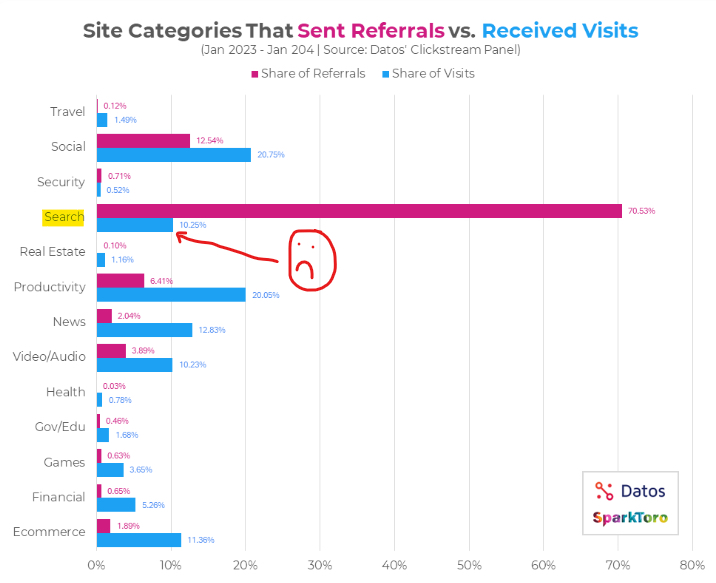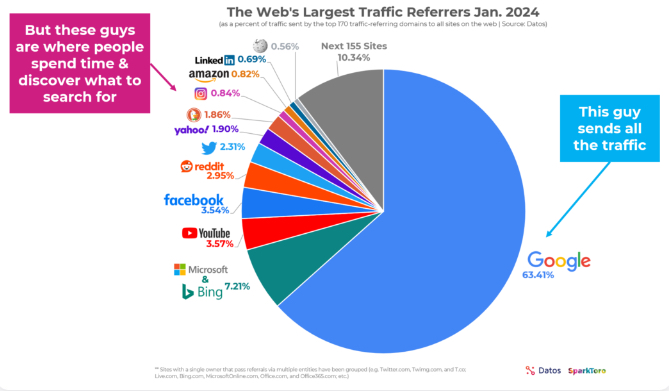
Liquidity Is Back On the Menu, Boys
A cornucopia of news, analysis, and pretty pictures
March 24, 2024 · Updated January 23, 2026
Sponsored By: Plumcat Animation Studios
The web is full of generic, mediocre content but you can stand out with Plumcat's premium animated videos. Through human creativity and engaging storytelling, we elevate your brand, so you're not just getting custom videos; you're investing in a powerful tool to boost sales and build a genuine connection with your customers. Allow us to showcase your product in a new light that engages and captivates.
Happy Sunday! Reddit and a semiconductor company went public. These will inject much-needed capital into the industry, allowing for more startups to be funded. Yay, money! For a newsletter that can hopefully make you money, please see below.
Our stories
“Startup Lessons From Y Combinator’s Most Sought-after Executive Coach” by Alice Lemee and Gena Gorlin: Amy Buechler was the first executive coach for YC founders—she gave elite founders the emotional skills necessary to build billion-dollar companies. This piece is about all that she learned from that experience. Read along to see the wisdom that comes from mentoring thousands of founders.
“How We Built the Internet” by Anna-Sofia Lesiv: The internet is a Rube Goldberg machine of servers, wires, and cables. It is a miracle of human ingenuity and government funding that is slowly being taken over by private interests. In this piece, Anna-Sofia Lesiv tells the story of the internet, from its humble start sharing space with the telephone dial to the heroes who willed its infrastructure into existence. Read this to appreciate how arguably the most impactful technology of our lifetimes came to be—and to understand where it is going.
🎧 “Prozac and ChatGPT: How Technology Is Changing the Way We See Ourselves” by Dan Shipper/Chain of Thought: We know this is weird, but stick with us: There is a relationship between Prozac and ChatGPT. Both are tools that allow us to examine questions around the role of intelligence and self-examination in regards to our emotions. What is intelligence? What is the self if robots can mimic our thoughts exactly? Listen to Dan’s interview with psychiatrist and author Peter D. Kramer about how both technologies change what it means to be and feel human. 🔏 Paid subscribers have access to the episode transcript.
“Why Polarity Pays” by Evan Armstrong/Napkin Math: It’s not about techno-euphoric media versus anti-tech media. It’s about incentives. All media either sells ads or subscriptions with scale or tries to gain power with sway. Read this to work through your own tribalism and better understand the incentives of every tech writer you are reading (including us!).
The backchannel
For the past few weeks, I’ve been flying around to different tech conferences picking up interesting rumors and tidbits of news. One important thing keeps popping up in conversation: Waymo, Google’s self-driving car, is finally working in San Francisco. It’s quickly become the favored mode of transportation for a few of the people I’ve talked to. They confided that they felt safer in a Waymo car than in a human-driven Uber or Lyft.
This is important for a few reasons. First, it shows how quickly our attitudes toward new technology can change. For a few of these people, riding in a self-driving car was a scary experience at first, but now is actually preferable to the old way of doing things. Second, it’s important to pay attention to on-the-ground experience because this news is likely to be ignored by those who haven’t tried it yet. Tech companies have been trumpeting the arrival of self-driving cars for a decade now, and to some people it might sound like crying wolf. That means that the significant progress that Waymo has made—including recently expanding from service SF and Phoenix to parts of Los Angeles—might not get the reception it deserves.
In my opinion, self-driving cars are finally here. This is not the consensus view (we’ll be publishing some dissenting opinions on the tech in Every soon) but if you haven’t, now is the time to start taking it seriously. —Dan Shipper
Chain of links
Chips and bits from Nvidia: Nvidia hosted its annual meeting about magic sand (its chips). The big news was twofold: a new GPU that can train and run AI workloads way cheaper than previous iterations and a foundation model for humanoid robotics. Essentially, AI is getting cheaper and gaining physical form. This is a company that has hit a $2 trillion valuation on the basis of its ability to forecast and deliver what is next in hardware, so it’s worth paying attention to what it thinks is next—and what is next is the Terminator.
Heads Apple wins, tails Google loses: Apple is in talks to incorporate Google’s Gemini line of models into the next iPhone. It’s likely that only Google or Microsoft has the scale of chips and servers necessary to suddenly bring AI to hundreds of millions of iPhones. We’ll wait to cast judgment until we see who is paying who, but this is a long-time Apple strategy. Pay suppliers and then, once the component proves to be important enough, bring it in house.
Acqui-licensed by Microsoft: This is one of the weirdest deals I’ve ever seen. The backstory is that Inflection, an AI startup competing with OpenAI in building foundation models, was doing only so-so with users, even though the team was excellent and had raised over $1 billion. This week Microsoft hired the majority of the team, while paying $650 million in licensing fees to the Inflection S-Corp to make the original investors whole. Legally, this isn’t quite an acquisition, so Microsoft is likely hoping to skirt federal antitrust scrutiny.
Look at me, I’m the Masa now: Saudi Arabia’s Public Investment Fund (PIF) is looking to form a $40 billion investment vehicle focused on AI. There is arguably already too much money going after the model and application layer of AI—this will 10x that problem. Plus, the uncomfy ethical conversations about how comfortable your funding sources are with dismembering journalists will need to be had in Silicon Valley.
A startup wants a 450x revenue multiple: OpenAI competitor Cohere is a wonderful product, with a strong team, doing important work. The company is also seeking a bat-shit crazy, loco-moco, where-do-you-get-off type revenue multiple. The firm has an annualized revenue run rate of $13 million and is seeking a $6 billion valuation. Like we've been banging the drum on for awhile now—AI is in a pricing bubble. —DS and Evan Armstrong
The napkin math
Reddit has to build a business now: The social-media stalwart went public last week with a valuation that reached close to $10 billion and is still swinging around by 5-to-10 percent. Regardless, when I examine the multiples, the price that people are currently paying is quite high. It’ll be fascinating to see where it ends up.
Uncle Sam wants an iPhone: The U.S. Department of Justice sued Apple for abusing its monopoly around the iPhone. What is so frustrating about this is that the strongest arguments for Apple’s monopoly power—prohibiting sideloading apps and setting 30 percent App Store commission rates—are only tangentially mentioned. I’ve been working through the 88-page complaint this weekend and, so far, I am deeply unimpressed. There is a case to be made, but it appears that the DOJ isn’t capable of making it.
$700 million for microwaved meat: Marc Lore is the founder of Jet.com and Diapers.com, and the co-owner of my beloved Minnesota Timberwolves, so I have a vested interest in all things in the LoreVerse. His newest venture is a New York-based food company that just raised $700 million. The company pre-cooks food in large industrial kitchens and heats it up in locations near consumers. So…it’s Applebees? Regardless, I don’t care if this is a good idea. I just need him to get richer so he can subsidize my team.
I called it. Last week I told you that Telegram, the messaging service worth tens of billions, started talking to the press because it was likely raising capital. This week, the company announced it had raised $330 million. As my wife would tell you, I love to say this, but: I told you so. —EA
For the love of charts
Search is hogging all the attribution. Here’s an underappreciated but obvious fact: Even though search is the most common source of user traffic for most publishers, it’s not really the origin of it. A good chunk of search is URL lookups. Users already know what brand or product they’re looking for, and just use Google to get there. Google technically got them there, but didn't obviously get them there.
To quantify the observation, Rand Fishkin, CEO of market research firm SparkToro, bucketed clickstream data into “referral” (the redirect) and “visits” (the user's destination). Unsurprisingly, while search owns a massive share of referrals (70 percent), it’s only a small share of visits (10 percent):
Search might be the previous stop before the user finds you, but no one spends that much time on search. In all likelihood, the user found you somewhere else on the internet, where they actually spend their time.
You might be making a big mistake if you look at referral source data and conclude, This must be where I should put my marketing spend. It would be like a hotel deciding that Uber was the source of all its guests, when, of course, the customer already booked the hotel long before they got in the Uber. Put another way:
Blue takes all the attribution credit, but don’t be fooled by the rocks that it’s got. —Moses Sternstein
The examined life
Where do power laws come from? I’ve been pondering this question a lot lately. My own research has shown that it appears to be a universal rule of the internet. Ninety-nine percent of the value accrues to the 1 percent. Why and when systems—whether social, biological, or technological—exhibit this phenomenon is the subject of this YouTube documentary I enjoyed. If you have any suggested reading on power laws, please email me at [email protected]. —EA
Marilynne Robinson is wise. Being Christian is hot again on tech Twitter. If you want to get in on the trend—or if you’re just a curious person who’s looking for an accessible perspective on one of the foundational texts of the Western world—you should check out Reading Genesis by Marilynne Robinson. She’s incredibly warm and humanistic—she reminds me of George Saunders when he’s not being absurd—and explains the contents of this book in a way that resonates regardless of your religious background (or lack thereof).—DS
Eye candy
What if OpenAI made a laptop? We’re excited by the new hardware possibilities that AI enables. —Lucas Crespo
Source: Every/Lucas Crespo.
Are you ready to incorporate AI into your business?
Dan Shipper and the Every team are working with select businesses to research, implement, and train your team on the use of AI solutions within your workflows. We'll dive deep into your sales, operations, success, engineering, and product organizations to help you find places to use the latest AI tools like ChatGPT, Claude, and Gemini.
If you know that your teams should be benefiting from AI, but you haven't yet seen adoption or efficiency gains from the technology, this offering is a good fit for you. At the end of our engagement you'll find product opportunities and workplace efficiencies to help you cut costs and accelerate your business.
We’re currently working with mid-sized and large companies. If you’re interested, reply to this email and let us know.
That’s all for this week! Be sure to follow Every on X at @every and on LinkedIn. Was this newsletter forwarded to you? Sign up to get it in your inbox.
The Only Subscription
You Need to
Stay at the
Edge of AI
The essential toolkit for those shaping the future
"This might be the best value you
can get from an AI subscription."
- Jay S.
Join 100,000+ leaders, builders, and innovators

Email address
Already have an account? Sign in
What is included in a subscription?
Daily insights from AI pioneers + early access to powerful AI tools









Comments
Don't have an account? Sign up!